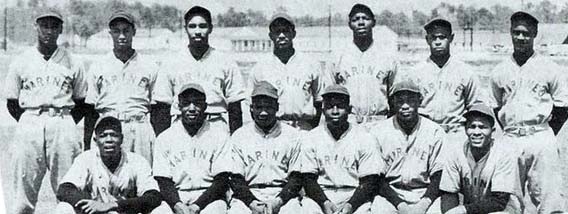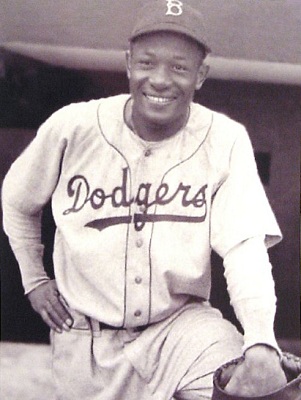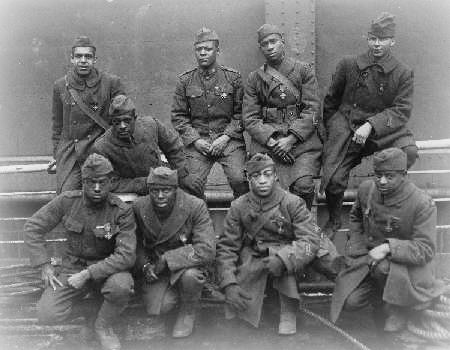(Re-posted from 1-21-13)
Let’s face it, there has never been another Jackie Robinson and there never will be. However, there was another young man who broke the color barrier in major league baseball as a pitcher.
Some time ago I heard a trivia question to which I knew the answer. The question was: “Who was the first black pitcher in major league baseball?” I definitely am not a trivia buff but I knew this one. One guess was Satchel Paige while the second was Don Newcombe. Those were great guesses and I expect both participants thought they had the correct answer. Satchel Paige, at age 42, made his first start for the Cleveland Indians on July 9, 1948. He was the oldest player to ever debut in the majors. Don Newcombe’s initial start with the Brooklyn Dodgers was on May 20, 1949. He became the first black pitcher to start a World Series game. It was easy to see why those would be good guesses to the trivia question. However, both were incorrect.
The first black pitcher to pitch in a major league baseball game was Dan Bankhead who debuted with the Dodgers on August 26, 1947, a little over four months after Jackie Robinson’s major league debut. (April 16, 1947)
Daniel Robert Bankhead, a right handed pitcher, was born on May 3, 1920 in Empire, Alabama. He had four brothers who all played baseball. He grew up in Empire with his brothers Sam, Fred, Garnett and Joe. Sam was said to be the best of the five brothers. Sam Bankhead played multiple positions, had a Carl Furillo arm, hit .342 in exhibition games against major league baseball players and had a Jackie Robinson craving to win. However, Dan was the only one of the five brothers to play major league baseball.
In 1940 Dan Bankhead signed with the Chicago American Giants before he reached his twentieth birthday. He had an above average curveball, a screwball that we seldom see used in present day pitching repertoires and a fastball that garnered much attention. Satchel Paige stated that: “Dan Bankhead, youngest member of the Bankhead baseball brothers, throws a faster ball than Cleveland’s speedy Bobby Feller.” Young Bankhead’s main problem, not uncommon with young pitchers throwing heat, was control. Following the family tradition, he was a versatile player and was one of the best hitting pitchers in the Negro Leagues.
Bankhead was traded to the Birmingham Black Barons in 1941. He went 6-1 in 1941 with a 0.96 RA (runs against) and was named to that year’s East-West game. As a twenty-one year old, he garnered more votes than all pitchers except Satchel Paige, Hilton Smith and “Preacher” Henry. In doing so, Bankhead was keeping lofty company. In that game, he pitched two scoreless innings allowing one hit and one walk for the West. Some thought he was the next Satchel Paige. A confident young man aware of his ability, he did not have a self esteem problem. He negotiated hard and quite often was the highest paid player on the teams for which he played.
Bankhead continued his impressive start in 1942 opening the season with three consecutive wins, running his short career record to 11-2. Like many, his career was put on hold by World War II. He served his country as a Marine in an all black unit from 1942-45.
During that time he was able to keep sharp by playing on his unit’s baseball team. In the fall of 1943 Dan was the starting pitcher for the Montford Point-MCB baseball team, comprised of the first blacks to enlist in the Marine Corps.

While in the Marines, Bankhead played for the Montford Point Marines baseball team.
(Photo courtesy of commandposts.com)
Following the war Bankhead returned to his first love – baseball – having given four seasons to his country. In 1946, he returned with the Memphis Red Sox as their highest paid player. He had a successful return going 7-3 with a 3.14 RA, third behind Satchel Paige and Gentry Jessup. During the winter of 1946-1947, Bankhead played for Cagnus in the Puerto Rican Winter League, striking out 179 with a record of 12-8. He appeared in both the 1946 and 1947 East-West games. His appearance in the 1947 game caught the attention of Branch Rickey and led to a contract with the Dodgers. Perhaps he had another Dodger first, as in 1947 he had an agent negotiate his contract for him.
Unlike Jackie Robinson, Dan Bankhead came directly to the Dodgers without any preparation in the Dodger minor league system. In August he made his big league debut to become the answer to the trivia question. That is, he became the first black pitcher in the major leagues. Unfortunately, his inaugural season was not a huge success, certainly not what the Dodgers were expecting. He allowed 8 runs and 23 base runners in 10 innings over four games.
Both 1948 and 1949 were great years for Bankhead, both in the minors. In 1948 he won a total of 24 games going 20-6 with a 2.35 ERA and spinning a no-hitter for the Nashua Dodgers. He led the New England League in wins and was second in ERA. He also was 4-0 with a 3.60 ERA for the St. Paul Saints.
In 1949, Bankhead went 20-6 with a 3.76 ERA for the Montreal Royals. He was second in the International League in wins, two behind Al Widmar, and led in starts (34) and strikeouts (176). He hit .323/.353/.449 and took turns in the outfield, at first base and as a pinch-hitter. However his control continued to be an issue and his 170 walks matched his strikeout total and lead the International League.
Bankhead returned to the Dodgers in 1950 with better results. He won nine games but had a higher than expected ERA. Off to a slow start in 1951, losing his only decision, he was sent down to Montreal. Dan Bankhead was not to return to Major League Baseball. His nine wins in 1950 were to be his only wins at the Major League Baseball level. He continued to play baseball for a living until 1966, playing mostly in the Mexican League as a pitcher and more so as a position player. Bankhead suffered from a sore arm, possibly a rotator cuff injury. He was a good hitter and tried to extend his career as an everyday outfielder. He did have moderate success. Bankhead pitched and played outfield in the Minors and in Mexico until 1966 when he was 46. He had a lifetime winning percentage in the minors of more than .700, while batting .255 with 11 homers.
Dan Bankhead was the first black pitcher in Major League Baseball history. He also is the answer to another trivia question: “Who was the first black player to hit a home run in his first AB in Major League baseball?” The answer – Dan Bankhead – who hit a home run off Fritz Ostermueller of the Pittsburgh Pirates on his first swing in the big leagues.
Sadly, Daniel Robert Bankhead died from cancer one day shy of his 56th birthday.




 August 28th, 2013 at 6:00 am
August 28th, 2013 at 6:00 am  by Harold Uhlman
by Harold Uhlman 

 Posted in
Posted in 

Another great post, Harold, and I thank you for once again broadening my knowledge (although I was aware that Bankhead was credited with being MLB’s first black pitcher.
Being a Toledo resident, I must inform you and all the readers of this forum that there is a dispute as to Jackie Robinson being the first black major leaguer. In 1884 the Toledo Blue Stockings were members of the American Association which competed with the National League and as such were considered a major league team. Their catcher was Moses Fleetwood Walker, a graduate of Oberlin College, and some historians consider him to be the Majors’ first black. His story is quite interesting, as is his legacy, and I suggest to anyone who is interested that “googling” him will provide some interesting reading.
In Toledo there is a Moses Fleetwood Walker Society whose sole purpose is to raise money for inner-city baseball in Toledo, a fine organization to whom I make an annual contribution.
I have heard about Moses Walker, a catcher, and am aware of the controversy with historians regarding who broke the color barrier. I’m not sure it makes much difference except that Walker unfortunately, outside of Toledo, has not gotten the recognition he deserves.
I think Jackie’s debut in the golden era of baseball, immediately paving the way for many African-American players, had a much greater impact on integration in baseball so he does get the credit he deserves.
In any event,these two men and others, have a significant place in the history of major league baseball.
I would imagine, Dick, that many are aware of the Blue Stockings history and legacy with the game. However, Jackie Robinson will always be regarded the first black player within the modern era of Major League Baseball. I’d even suggest that while the Blue Stockings certainly had to endure the injustices of their day, had it not been for the inception of Jim Crow laws, their team might have had a longer tenure of existence. Extreme bigotry and hatred toward blacks was just getting revved up in the days of the Blue Stockings, mainly because “Jim Crow” laws didn’t start making their appearance until 1876. The “brewing pot” of social injustice of their day was just beginning to reach a simmer.
With the Civil Rights Movement having gained momentum during Jackie’s day, bigotry and hypocrisy of society had boiled over and was ripe for turmoil. Sweeping changes were inevitable and were being made on behalf of blacks throughout the country… and many whites ensconced in the brainwashing of the day, weren’t happy about it. Because of this, having blacks playing the game of baseball was more widely accepted during their time. As things got furthur out of hand, during the turn of the century, MLB was seen as a white only league… and so the brainwashing continued throughout the early to mid 1900’s, at a time when a hero like Jackie Robinson was truly needed.
Moses and his brother were the only two blacks on the team, and some teams refused to play them because of their presence.
I was in no way suggesting that Jackie was an impostor. In my mind he changed the world, much less professional sports, forever and he represents all that is good about the human spirit. My post was only informational, not confrontational nor correcting.
We know you weren’t that Dick. You are right the controversy doesn’t change the impact of Jackie Robinson on the social fabric of the US.
Dan Bankhead got a bit lost in the shuffle like another player we all know. More on that later.
What a great post, Harold. I listened to a few minutes of that Red Barber Dodger broadcast that was posted over at blueheaven.com and heard Red mention that Bankhead was the first black pitcher in the majors. There are so many stories to be told about this historical era, and less and less witnesses are around today to tell the stories. Thanks for the look back at baseball history.
Another great post, Harold, and certainly a timely one as we honor the birthday of Martin Luther King Jr.
In the book ‘The Boys of Summer’ author Roger Kahn wrote:
Later in the book he wrote:
Thanks Harold for another story of a pitcher that I remember pitching for the Dodgers, whom I only knew as a Dodger and nothing else of his backround before and after his major league career.
Your story about Dan Bankhead brings back fond memories because I attended that game at Ebbets Field. It was the last game of the regular season. (In those days the World Series started on the first of October since there weren’t any playoff series.) I had just been discharged from the Navy and was about to go back to school. A friend of mine and I decided to go see the Dodger game. I hadn’t seen one in over a year, although in earlier years I went to see the Dodgers play several times a year. It was the first time either of us would see Jackie Robinson play, but we didn’t know anything about Bankhead except that he was the first black pitcher. He did well pitching in the game and to top it off he hit a home run. His major league career continued but he didn’t pitch very much. His career record was 9-5, most of it in 1950. He didn’t pitch after 1951. The 1947 Series was won by the Yankees, but the highlight was Cookie Lavagetto’s double in the last of the ninth of game 6 that won the game for the Dodgers and broke up Bill Bevins’ bid for the first World Series no-hitter. I didn’t see that game, but my brother did.
Wow! Thanks for your comments, Richards!
We have a couple of regulars here on ThinkBlueLA who attended games at Ebbets Field. We even have one member who grew up across the street from the ballpark. Appropriately enough, his handle here on the site is: ebbetsfld.
Please feel free to chime in at any time and also please consider joining our loyal Dodger fan family over on the forum: https://thinkbluela.com/forum
Thanks again for sharing your wonderful memories with us.
You just never know who has seen what. Thanks for reading the article and telling a real live Dan Bankhead recollection.
RT @Think_BlueLA: Re-post – The Other Jackie Robinson
This was the first time I read Richards’ comment above. I heard that game on the radio when Cookie Lavagetto hit that walk off homer that won that game he mentioned above. I’ll never forget Red Barber saying, “Here comes the tying run and—here—comes—the—winning—run”. One of my first thrills as a Dodger fan. Unfortunately the Dodgers didn’t win that World Series, but it’s still a great memory.
Correction, I mean double. It was a double off the right field wall.